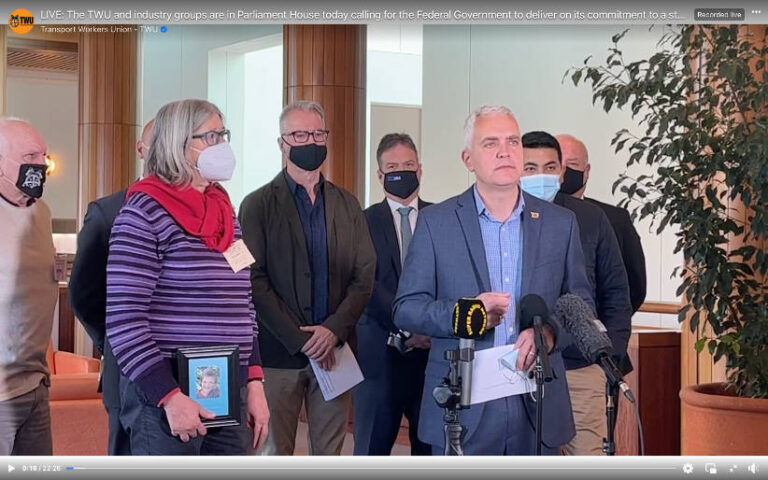Heavy vehicle industry heavyweights went to Canberra in late July to urge the Federal Government to reinstate a tribunal for the truck industry to stanch the spread of deadly unsafe practices linked to so-called gig-economy.
“The gig economy is taking hold. It’s now infiltrated the major transport companies in our community and there’s a downward spiral that’s out of control,” Michael Kaine, national secretary of the Transport Workers Union, said at a press conference timed to coincide with the first parliamentary session since the Federal election in May.
The union and company bosses said gig-style arrangements such as those used by Amazon Flex are taking root, most recently at FedEx, and putting pressure on truck operators to drive fatigued and cut corners on safety.
Academic studies and coroners’ reports have shown links between road safety and the pressure drivers are put under because of poor financial returns. This pressure includes speeding, driving long hours, skipping mandatory rest breaks and forgoing maintenance on their trucks.
Kaine said more than 100 people have died in truck accidents on Australian roads so far this year, including 26 drivers.
Kaine said gig-economy drivers’ pay, like those driving for Amazon Flex, was below the minimum wage. He cited practices where drivers need to deliver as many as 90 packages in a four-hour block. “They exploit workers,” he said.
The Amazon Flex website advises potential drivers of their remuneration as: “Nationally, sedan drivers earn a minimum of $108 for a 4-hour block, $162 for a 6.5-hour Large Passenger Vehicle block and $225 for an 8-hour Cargo Van block.”
“This is putting downward pressure on our transport industry,” said Kaine, adding, “Just in the last couple of weeks, we’ve had a major transport operator FedEx — bought TNT, announced a gig-style arrangement on the express basis that it needs to compete with the gig economy. Now more people are going to die unless this is addressed.”
Kaine was joined at Parliament House in Canberra by Labor Senator Tony Sheldon, Peter Anderson, national secretary of the Australian Road Transport Industrial Organisation, Cameron Dunn, managing director at bulk carrier FBT Transwest, among others including drivers and truck accident victims.
A former Amazon Flex driver, introduced only as Marcus, said he was concerned about lack of training as well as poor remuneration practices spreading to another big operator — FedEx. “I remain concerned, you know, what happened next to us?”
Anderson, who mentioned advocacy in the Fair Work commission, said: “We’re actually there trying to advocate for an improvement in our industry to make it safe, to make it sustainable, to make it an industry that people want to work in. At the moment we’re an industry in crisis.”
“I’m here to support reform to make sure that all parts of the supply chain are accountable so that chain of responsibility legislation can actually be enforced,” said Dunn, adding, “I’m here to support reforms that allows good businesses like mine to look after our staff and have a safe environment for them.”
The former coalition government led by then prime minister Malcolm Turnbull disbanded the Road Safety Remuneration Tribunal in 2016. The RSRT’s key role was setting minimum pay and conditions for drivers. While other functions of the tribunal have flowed over to the National Heavy Vehicle Regulator, pay and conditions arbitration isn’t one of them.
The RSRT had been established in 2008, at the recommendation of the National Transport Commission that found a link between driver remuneration and safety outcomes for truck drivers.
Senator Sheldon affirmed Labor was going to regulate the gig economy. “They’re committed to make sure we have employee-like regulation,” he said, adding, “In an industry that’s already under such pressure, where the death rates and injury rates are 10 times the national average of any other industry, quite clearly, this is an opportunity to make change.”






